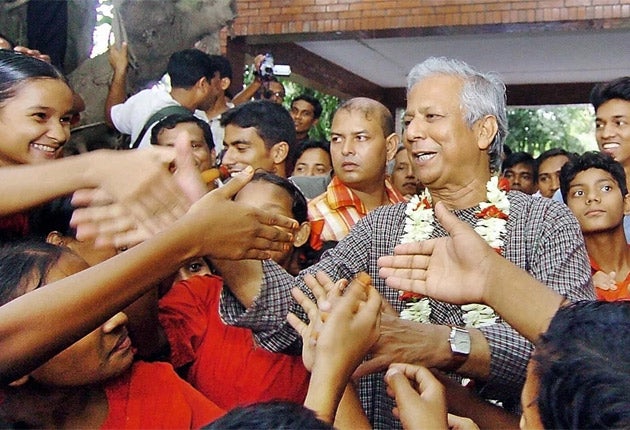Microfinance pioneer fired from bank in Bangladesh

Your support helps us to tell the story
From reproductive rights to climate change to Big Tech, The Independent is on the ground when the story is developing. Whether it's investigating the financials of Elon Musk's pro-Trump PAC or producing our latest documentary, 'The A Word', which shines a light on the American women fighting for reproductive rights, we know how important it is to parse out the facts from the messaging.
At such a critical moment in US history, we need reporters on the ground. Your donation allows us to keep sending journalists to speak to both sides of the story.
The Independent is trusted by Americans across the entire political spectrum. And unlike many other quality news outlets, we choose not to lock Americans out of our reporting and analysis with paywalls. We believe quality journalism should be available to everyone, paid for by those who can afford it.
Your support makes all the difference.Anger greeted the announcement last night that Nobel laureate Muhammad Yunus, internationally famed for his work in microfinance, was being forced by the Bangladeshi authorities from his position at the head of the bank he founded.
In the latest twist in a series of long-running clashes between the 70-year-old and the government headed by Prime Minister Sheikh Hasina, an official with the central bank said Mr Yunus had been pushed out from his position as managing director of the Grameen Bank for breaching regulations. The Grameen said Mr Yunus will stay and fight his position.
Precisely which offence Mr Yunus is alleged to have committed is unclear. One official told reporters Mr Yunus was in breach of a law that required people to retire at the age of 60. Another said his age was not the issue, but that the microfinance pioneer had breached the Grameen Bank's own regulations when he was appointed to his post in 2000 without the prior approval of Bangladesh's central bank.
Mr Yunus founded the Grameen Bank in 1983 with the intention of providing microcredit to impoverished Bangladeshis unable to obtain loans from commercial or government banks.
The bank has 2,500 branches and lends out $100m (£61m) every month to 9 million borrowers. Around 97 per cent of those it lends to are women. The bank has inspired others around the world and has won the support of high-profile figures such as Mary Robinson, former Irish president and United Nations High Commissioner for Human Rights.
But in recent months Mr Yunus has found himself at the centre of controversy. Not only have for-profit microfinance lenders been accused of exploiting their customers by a drive for dividends, but Mr Yunus himself was accused of impropriety by a Norwegian documentary. An investigation by the Norwegian government subsequently cleared him. Mr Yunus has always denied any wrongdoing and has attacked microcredit organisations trying to make profits from the poor.
Observers said the reasons for the bid to drive Mr Yunus from the Grameen Bank, in which the government holds a 25 per cent stake, appeared more likely to be related to animosity between him and Mrs Hasina that dates back several years to when Mr Yunus spoke of the need to reform politics and considered forming his own party. Mrs Hasina may covet the additional political leverage that greater control of the bank would bring. In December, she accused Mr Yunus of "sucking blood from the poor".
"She thinks she deserved the Nobel Prize, knows Yunus is the most famous Bangladeshi, and perhaps projects herself on to him, seeing him as a potential political rival with a base of [9 million] Grameen members," said David Roodman, a fellow at the Centre for Global Development in Washington.
Who will win this power struggle and how the dispute might end is unclear. Last night, the Grameen Bank said Mr Yunus was continuing in his position. "This is a legal issue. The Finance Minister has himself stated that this is a legal issue. Grameen Bank is taking legal advice," said the bank's statement.
Join our commenting forum
Join thought-provoking conversations, follow other Independent readers and see their replies
Comments